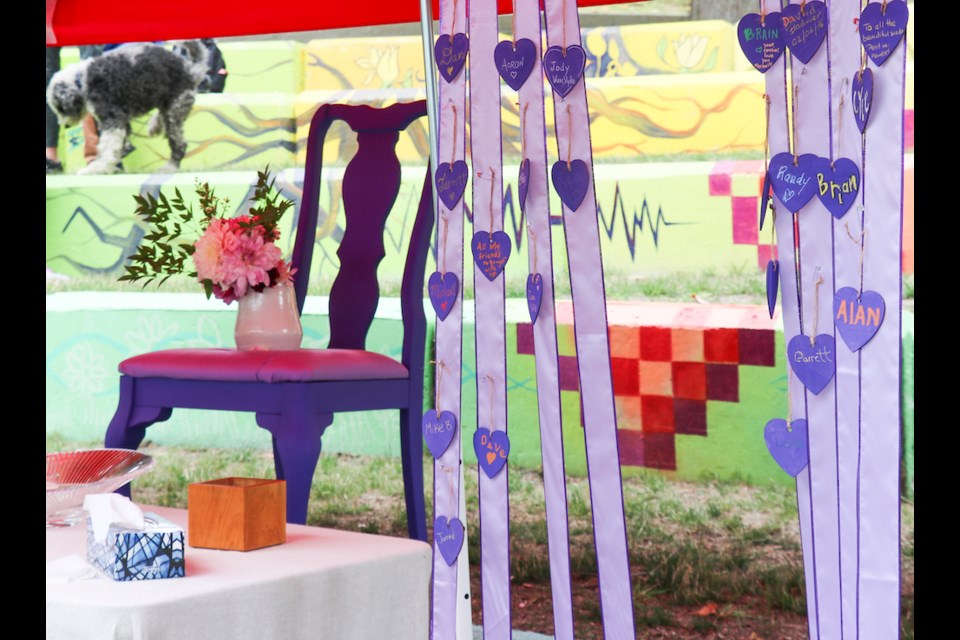A purple chair, empty except for a flower bunch laid across it, had the place of honour at the International Overdose Awareness Day event in Sechelt Aug. 31. The memorial for those lost to the toxic drug crisis included a series of purple sashes to which attendees fastened purple hearts with names and tributes to their loved ones who have died.
Dozens of attendees gathered to remember the people who have died from the toxic drug supply and bring awareness to the people still living in the second such event held at Hackett Park. The event came the week the BC Coroner’s Service said that at least 1,455 people in B.C. died of toxic drugs between January and July this year – at least 12,739 have died in the province since the B.C. government declared a public health emergency in April 2016.
Between 2016 and April 2023, the BC Coroner's Service reports that there were 51 "unregulated drug deaths" in the Sunshine Coast Local Health Area. (That does not include Powell River.)
“Every overdose death is a government policy failure,” peer Kenn Quayle of i2i Peer Support told the crowd of dozens. He has worked in peer advocacy for decades, on the Coast and out east. “Almost everybody knows someone at this point who has been personally affected by the overdose and toxic drug crisis. If it's not someone personally known to us, it’s our next-door neighbour or someone we’ve spoken to on the street, on the bus, while shopping.”
Quayle pointed to the free naloxone kits and training as one of the successes seen in fighting the crisis, as well as the creation of overdose prevention sites. “We are building a community where people are learning to care for each other and to help to prevent overdoses.” But, stigma and shame still pervade and the majority of overdose deaths happen when people use drugs alone.
“Along with awareness comes response and responsibility. And that's what we're doing here together, is responding to…our increasing awareness of this crisis,” said Quayle.
Peer Brian Mackenzie, Quayle’s husband and partner in i2i Peer Support, commented that he’d heard feedback from last year to keep the event a little more upbeat. “I decided to focus on cheerful facts about overdose awareness. And I guess that's it for my talk,” he joked. “But actually, I think our society's tendency to avoid grief and other uncomfortable emotions is one of the things that pushes people to use substances and use them in isolation.”
The balance of grief and resilience pervaded the event as the Threshold Singers – whose mandate it is to sing at the bedsides of people very sick or dying – gave a moving performance beside a booth offering free naloxone training. Sunshine Coast Hospice welcomed attendees to find support in their grief – opposite the wide-open mobile Overdose Prevention Site van (open 5 to 11 p.m. seven days a week and parked behind RainCity’s High Tide building).
While some thanked the crowd from the mic on stage, others shared their stories and connected in smaller groups – at least one mother wearing a purple heart for her son over her own heart.
As the crowd petered down, a ukulele came out and a performer sang Ruth B’s Lost Boy while an earlier speaker gave a belting impromptu rendition of John Denver's Country Roads.
The purple sashes with the hearts for loved ones will move to the garden behind Sunshine Coast Community Services, the MC told the crowd, “It will be alive in the community.”
The event was organized and supported by Sunshine Coast Community Action Team, i2i Peer Support, Vancouver Coastal Health, Sunshine Coast Hospice and RainCity Housing.




